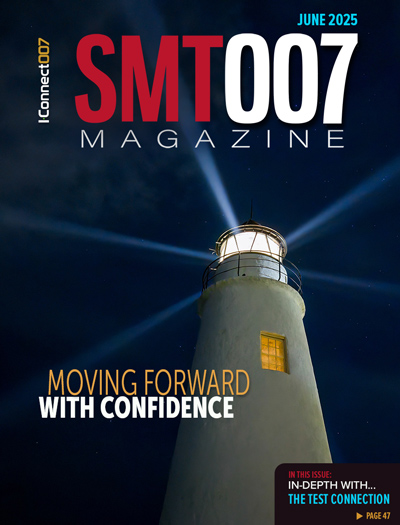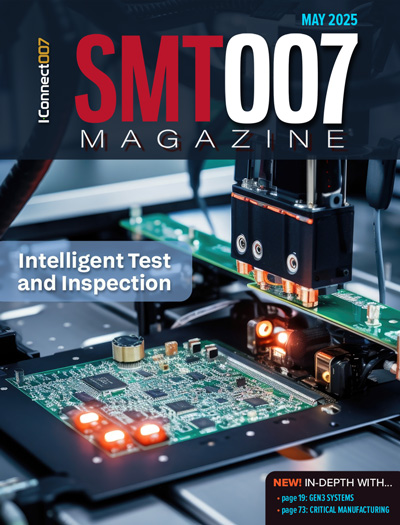-

- News
- Books
Featured Books
- smt007 Magazine
Latest Issues
Current Issue
What's Your Sweet Spot?
Are you in a niche that’s growing or shrinking? Is it time to reassess and refocus? We spotlight companies thriving by redefining or reinforcing their niche. What are their insights?

Moving Forward With Confidence
In this issue, we focus on sales and quoting, workforce training, new IPC leadership in the U.S. and Canada, the effects of tariffs, CFX standards, and much more—all designed to provide perspective as you move through the cloud bank of today's shifting economic market.

Intelligent Test and Inspection
Are you ready to explore the cutting-edge advancements shaping the electronics manufacturing industry? The May 2025 issue of SMT007 Magazine is packed with insights, innovations, and expert perspectives that you won’t want to miss.
- Articles
- Columns
- Links
- Media kit
||| MENU - smt007 Magazine
Stadium's Wireless Expertise Plays Integral Part in TRL’s eCall Test Proposals
November 5, 2015 | Stadium United WirelessEstimated reading time: 4 minutes
From 31 March 2018, all new car models are required to be equipped with eCall technology that will automatically communicate with the 112-based emergency response service in the event of a road accident.
Technology and expertise from Stadium United Wireless, a leader in the design and manufacture of Machine-to-Machine wireless technology, has helped TRL (the Transport Research Laboratory) to develop proposed technical requirements and test procedures for the type-approval of eCall in-vehicle systems.
Stadium United Wireless provided TRL, an independent transport research, consultancy and organisation, with telematics units and technical support in order to develop an appropriate set of test procedures for the eCall systems. The technology and support from Stadium formed an integral part in the development of proposed test procedures, which were developed and put forward by TRL to the European Commission (EC) in preparation of the mandatory European roll-out of eCall systems in 2018.
As part of the project TRL developed draft requirements and test procedures for seven technical aspects which include Resistance of eCall systems to severe crashes (sled test), Full Scale impact test, Crash resistance of audio equipment, Co-existence of third party services (TPS), Automatic triggering mechanism, In-vehicle system self-test, and Privacy and data protection.
Technical expertise and 12 telematics units provided by Stadium were used for experiments in the dedicated deceleration sled test element, and operability verification test procedures which set out to measure the mechanical resistance of eCall systems to severe crashes at accelerations up to 100 g. The samples were designed, produced and provided by Stadium United Wireless and included the telematics control module (ECU), containing the printed circuit board with GSM and GNSS modules, SIM card holder and SIM card, capacitors and other electronic components.
The test programme was designed and carried out by TRL using its in-house high-energy test sled facility, which uses a bungee propulsion system and deceleration elements to achieve severe deceleration levels. A physical and electronic inspection, via current consumption and GPS/GSM functionality, was carried out by Stadium United Wireless at the end of the tests which concluded that all 12 samples remained undamaged, even after being subjected to a deceleration of over 100 g.
Chris Harrison, Head of R&D at Stadium United Wireless, commented: “We were approached by TRL to participate in this important project due to our experience and expertise in developing wireless M2M solutions as we already work with a number of global OEMs in the automotive sector and in the design and manufacture of telematics products from our TS16949 approved sites in the UK and China.”
“We worked with the technical team at TRL to develop and carry out specific crash-based testing which tested the resilience and reliability of our range of telematics ECUs. The inspection results showed that all system designs under test, although not specifically crash-hardened, survived even the highest-severity deceleration. This demonstrates that the required level of deceleration-resistance for an ECU, including a dedicated battery, can be achieved by applying good and diligent system design practice, as recommended by our technical team, without applying overly burdensome crash-hardening methods to the units.”
“Working with TRL on this project was a fantastic opportunity for us to test our own units in high-impact crash scenarios. We are hopeful that the findings included in TRL’s proposal will go on to inform the guidelines and safety regulations set out by the European Commission for eCall systems as they have the potential to save thousands of lives through wireless technology.”
Matthias Seidl, Vehicle Safety Researcher at TRL, commented: “Our in-house test sled allows us to simulate collisions with peak decelerations considerably higher than most current vehicle tests. These high levels are necessary to ensure that eCall systems are still able to make an emergency call, even after a severe crash. The samples Stadium provided and its specific expertise in the design of these telematics systems helped us develop stringent but practical test procedures for eCall systems that can ensure that poor system designs, which could jeopardise the safety of road users, will not be allowed onto the European market”.
“The results can also be used to help shape the technical discussions at an international level in order to ensure that the same level of protection is provided to road users around the world. In fact, the suggested European standards have also been proposed to the United Nations working group on automatic emergency call systems.”
The eCall Regulation (Regulation (EU) 2015/758) empowers the European Commission (EC) to adopt delegated acts defining “the detailed technical requirements and tests for the EC type-approval of vehicles in respect of their 112-based eCall in-vehicle systems and the EC type-approval of 112-based eCall in-vehicle systems, components and separate technical units” and delegated and implementing acts regarding privacy and data protection.
The TRL report, entitled ‘eCall Phase 2 – Technical requirements and test procedures for the type-approval of in-vehicle systems’, can be downloaded free of charge from the European Commission website.
Suggested Items
The Global Electronics Association Releases IPC-8911: First-Ever Conductive Yarn Standard for E-Textile Application
07/02/2025 | Global Electronics AssociationThe Global Electronics Association announces the release of IPC-8911, Requirements for Conductive Yarns for E-Textiles Applications. This first-of-its-kind global standard establishes a clear framework for classifying, designating, and qualifying conductive yarns—helping to address longstanding challenges in supply chain communication, product testing, and material selection within the growing e-textiles industry.
Magnalytix and Foresite to Host Technical Webinar on SIR Testing and Functional Reliability
06/26/2025 | MAGNALYTIXMagnalytix, in collaboration with Foresite Inc., is pleased to announce an upcoming one-hour Webinar Workshop titled “Comparing SIR IPC B-52 to Umpire 41 Functional & SIR Test Method.” This session will be held on July 24, 2025, and is open to professionals in electronics manufacturing, reliability engineering, and process development seeking insights into new testing standards for climatic reliability.
Defense Speak Interpreted: Is DARPA Still Around After CHIPS?
06/24/2025 | Dennis Fritz -- Column: Defense Speak InterpretedWhen I first published my Defense Speaks Interpreted column in January 2019 on the Defense Advanced Research Projects Agency (DARPA ERI), the agency advocated for an expanded Defense emphasis on closing the growing technology gap in microelectronics. The emphasis was on “resurgence.”
I-Connect007 Editor’s Choice: Five Must-Reads for the Week
06/13/2025 | Marcy LaRont, I-Connect007Today is Friday the 13th, and in much of Western folklore, this is a day when bad luck is lurking. But while Friday the 13th may top Western superstition charts, the global calendar is sprinkled with its own unlucky legends. In Spain and Greece, the bad juju lands on Tuesday the 13th—a day linked to Mars, the god of war, and naturally, chaos. In Italy, it’s Friday the 17th that is feared, thanks to the Roman numeral XVII, which can be rearranged to spell VIXI—Latin for “I have lived” (a poetic way of saying you’re dead).
TTCI Celebrates Melanie Rutkauskas’ 10-Year Anniversary and Her Leadership of New Training Division
06/12/2025 | TTCIThe Test Connection Inc. (TTCI), a leading provider of electronic test and manufacturing solutions, is proud to celebrate Melanie Rutkauskas on her 10-year anniversary with the company.


